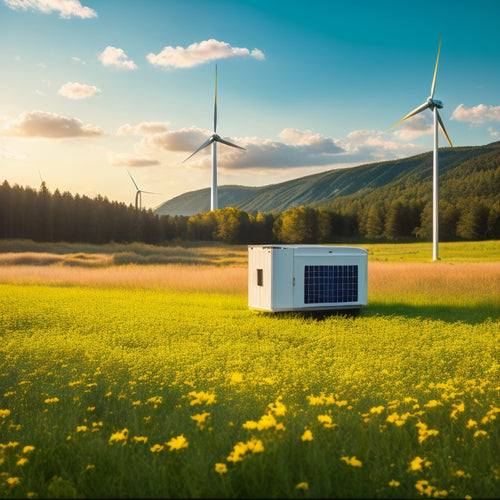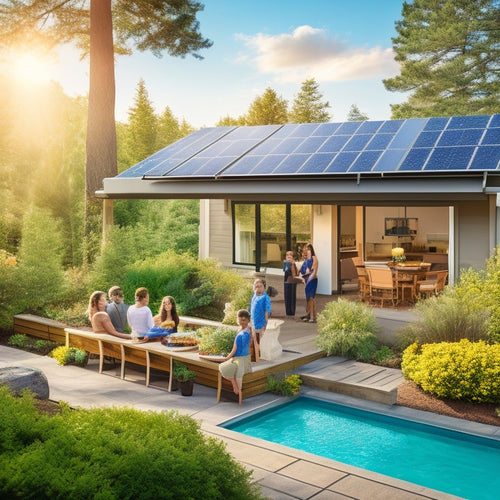
Off Grid Solar System With Battery Storage
Share
You're considering an off-grid solar system with battery storage, which means you're looking to utilize the power of the sun to meet your energy needs while ensuring a reliable supply of electricity at night and during periods of low sunlight. High-quality deep cycle batteries store excess energy generated during the day, allowing you to access power when you need it. Properly sized battery systems enable consistent power supply during darkness, supporting essential appliances and devices. To optimize your off-grid solar system, you'll need to assess your daily energy requirements, choose the right battery type, and consider factors like surge capacity - and that's just the beginning of your expedition to energy independence.
The Essentials
- High-quality home solar batteries enhance off-grid solar system efficiency, storing excess energy for nighttime power and low sunlight periods.
- Properly sized battery systems ensure consistent power supply during darkness, supporting essential appliances and devices.
- Monitoring battery state of charge, voltage, and temperature prevents issues and ensures stable power supply in off-grid solar systems.
- Deep cycle batteries are ideal for off-grid solar systems, maximizing renewable energy storage with recommended DOD above 80% for safe discharge.
- Assessing daily energy requirements and appliance power ratings is essential for designing an off-grid solar system that meets energy needs.
Energy Independence At Night
You've invested in an off-grid solar system to reduce your reliance on the grid, but you're still concerned about powering your home at night.
Without sunlight, your solar panels won't generate electricity, which means you'll need a reliable backup system to guarantee nighttime energy security.
By incorporating Home Solar Battery solutions and smart system design, you can store excess energy generated during the day for use at night.
With a deep cycle battery, you can rest assured that your energy needs are met even during extended periods of low sunlight.
Power Through Darkness
How do you guarantee that your off-grid solar system continues to power your home after the sun sets? The answer lies in a well-designed system that incorporates battery storage.
During the day, your solar panels capture energy from the sun, converting it into electrical power. However, as the sun sets, your solar panel efficiency drops, and you're left relying on your battery bank to power your home.
By integrating a battery storage system into your solar setup, you can unlock the full potential of renewable energy and create a more sustainable, dependable, and cost-effective power solution. Additionally, with a battery storage system, you'll gain protection from grid outages and fluctuations that can leave you in the dark.
To guarantee a seamless shift, it's essential to prioritize battery maintenance. This involves monitoring your battery's state of charge, voltage, and temperature to prevent overcharging or undercharging. A well-maintained battery bank will provide a stable and reliable source of power throughout the night.
When sizing your battery bank, consider your energy requirements during the night. Calculate your total energy consumption, including lighting, refrigeration, and other essential appliances. This will help you determine the necessary battery capacity to power your home through the night.
Nighttime Energy Security
With nighttime energy security, you can break free from reliance on the grid and enjoy uninterrupted power supply even after the sun sets. This means you can power your home, farm, or business without worrying about the limitations of daylight hours.
By integrating a high-quality house solar battery, such as the Tesla Powerwall or LG Chem RESU, Renewable Energy Solutions into your off-grid solar system, you can guarantee a seamless and efficient experience. A well-designed off-grid solar system with battery storage guarantees nighttime efficiency, providing a reliable source of energy when you need it most.
The key to nighttime energy security lies in energy storage. By storing excess energy generated during the day in batteries, you can tap into this reserve when the sun goes down. This allows you to maintain a consistent power supply, even during extended periods of darkness or low sunlight.
With a properly sized energy storage system, you can enjoy the freedom to power your essential appliances, lighting, and communication devices without relying on the grid.
Reduced Carbon Footprint Guarantee
You're assured a reduced carbon footprint with an off-grid solar system, which relies on an eco-friendly energy source that doesn't burn fossil fuels.
By switching to solar power, you'll considerably lower your emissions today, contributing less to climate change and air pollution.
With a renewable energy system, you can store excess energy generated during the day for use at night, and solar panels, photovoltaic cells, and inverters work together to provide a reliable power supply.
This clean energy solution guarantees a minimal impact on the environment, aligning with your values and commitment to sustainability.
Eco-Friendly Energy Source
Utilizing the power of the sun, an off-grid solar system greatly reduces your reliance on fossil fuels, thereby minimizing your carbon footprint and contributing to a cleaner environment.
By leveraging renewable resources through solar technology, you're not only reducing your environmental impact but also promoting sustainable living. With energy efficiency at its core, an off-grid solar system guarantees that you're using clean energy to power your daily needs.
As you shift to this eco-friendly energy source, you'll notice a significant decrease in your energy bills. This is because solar panels convert sunlight into electricity, reducing your dependence on the grid.
Plus, with solar incentives, you can enjoy tax credits and rebates that make this green innovation even more appealing. By choosing an off-grid solar system, you're investing in energy conservation and a healthier planet.
Lower Emissions Today
By utilizing the power of the sun, you directly reduce the amount of greenhouse gases emitted into the atmosphere, effectively shrinking your carbon footprint. This means you're contributing to a cleaner environment, free from the constraints of traditional energy sources. With an off-grid solar system, you're taking a significant step towards sustainable practices and reducing your reliance on fossil fuels.
| Traditional Energy Source | Off-Grid Solar System |
|---|---|
| High Carbon Emissions | Zero Carbon Emissions |
| Contributes to Climate Change | Mitigates Climate Change |
| Non-Renewable Resource | Renewable Resource |
| Limited Energy Independence | Complete Energy Independence |
Deep Cycle Battery Type
You'll need to take into account the battery life expectancy when selecting a deep cycle battery type for your off-grid solar system, as it directly impacts the system's overall performance and reliability.
When it comes to maximizing renewable energy storage and reducing reliance on the grid, choosing the right battery is essential high-performance batteries.
The cycle depth, which refers to the percentage of the battery's capacity that's used during each discharge cycle, matters greatly, as it affects the lifespan of the battery.
Battery Life Expectancy
Since your off-grid solar system's reliability hinges on its battery bank, understanding the battery life expectancy of your deep cycle batteries is vital. You need to know how long your batteries will last and what factors affect their lifespan. Proper battery maintenance is essential to extend the life of your deep cycle batteries. Regularly checking the electrolyte levels, ensuring the batteries are charged correctly, and avoiding extreme temperatures can greatly impact their lifespan.
| Battery Type | Cycle Life | Depth of Discharge |
|---|---|---|
| Flooded Lead-Acid | 300-500 | 50% |
| Absorbed Glass Mat (AGM) | 500-800 | 50% |
| Gel Cell | 800-1000 | 50% |
| Lithium-Ion | 3000-5000 | 80% |
The table above shows the cycle life and recommended depth of discharge for different deep cycle battery types. Note that the cycle life is affected by the number of charging cycles, and proper battery maintenance can help increase the overall lifespan. By understanding these factors, you can make informed decisions about your off-grid solar system's battery bank, ensuring you have a reliable source of energy when you need it.
Cycle Depth Matters
Selecting the right deep cycle battery type for your off-grid solar system is crucial, as it directly impacts the overall performance and reliability of your energy storage system.
When it comes to deep cycle batteries, cycle depth matters. Cycle depth refers to how deeply you discharge your batteries on a daily basis. If you're using your batteries to power your home during the night, you'll need a battery that can handle deep discharge rates.
You'll want to look for a battery with a high depth of discharge (DOD), typically above 80%. This means the battery can be safely discharged to 80% of its capacity without damaging it. A higher DOD also means you'll get more usable energy from your battery, increasing your battery efficiency.
When choosing a deep cycle battery, consider your energy needs and the discharge rates you'll require. For example, if you need to power your home for 8 hours at night, you'll want a battery that can handle a deep discharge rate of 80% or more.
Assess Your Energy Demands
You'll need to determine your daily energy requirements to design an off-grid solar system that meets your power needs. This involves calculating the total daily energy consumption of all your appliances, which requires knowing their individual power ratings.
By considering your energy usage patterns and exploring renewable energy solutions reliable energy storage, you can identify areas of inefficiency and optimize your system for maximum energy savings.
Daily Energy Requirements
Determining your daily energy requirements is an essential step in designing an off-grid solar system that meets your needs.
You'll need to calculate your energy consumption to guarantee your system can provide sufficient power. Start by tracking your daily energy usage, considering factors like lighting, cooking, refrigeration, and entertainment.
Be honest about your lifestyle habits and identify areas where you can make changes to reduce energy consumption.
You may need to make some lifestyle changes to optimize your energy usage. For instance, replacing incandescent bulbs with LEDs or using energy-efficient appliances can greatly reduce your energy demands.
Take note of your energy-intensive activities, such as running power tools or using a hair dryer, and consider alternative methods or schedules to minimize peak usage.
Appliance Power Ratings
Now that you've tracked your daily energy usage and identified areas for improvement, it's time to evaluate your energy demands by analyzing the power ratings of your appliances. This step is essential in determining the overall power consumption of your off-grid solar system.
You'll need to gather the power ratings of each appliance, including lights, refrigerators, computers, and TVs. Check the manufacturer's specifications or the appliance's nameplate for the power rating, usually measured in watts (W). Some appliances, like refrigerators, may have different power ratings for different modes (e.g., active, standby, or energy-saving mode).
When analyzing appliance power ratings, consider their efficiency as well. Look for appliances with high Energy Star ratings, which indicate superior energy efficiency. This can help reduce your overall power consumption and minimize your reliance on the grid.
Higher Surge Capacity Guaranteed
You need a solar system that can handle peak power demands without compromising performance.
That's where higher surge capacity comes in, ensuring your system can manage sudden spikes in energy usage.
Peak Power Handling
Most off-grid solar systems are designed to handle a specific amount of power, but what happens when you need a sudden surge of energy? That's where peak power handling comes in. Your off-grid solar system should be able to handle sudden spikes in energy demand, ensuring that your appliances and devices function properly.
Peak power handling is critical in energy management, as it determines how well your system can handle unexpected surges. A system with high peak power handling can support more appliances and devices, giving you the freedom to live off the grid without limitations.
Here's a comparison of different off-grid solar systems' peak power handling capabilities:
| System Type | Peak Power Handling |
|---|---|
| Small Residential | 5,000 - 10,000 W |
| Medium Residential | 10,000 - 20,000 W |
| Large Residential/Commercial | 20,000 - 50,000 W |
When selecting an off-grid solar system, consider your energy needs and the peak power handling required to support them. A system with higher peak power handling will provide you with the energy you need, when you need it.
Frequently Asked Questions
Can I Use Any Type of Battery for Off-Grid Solar Systems?
You can't use just any battery for off-grid solar systems; you'll need to choose compatible battery types that match your system's voltage, capacity, and chemistry to avoid compatibility issues that can compromise performance and safety.
Are Off-Grid Solar Systems Susceptible to Power Surges?
You need to take into account power surge protection when designing your off-grid system, as you're not tied to a grid's protective infrastructure; incorporating energy storage solutions with built-in surge protection guarantees your system's safety and reliability.
How Often Should I Maintain My Off-Grid Solar System?
Can you really afford to wait until it's too late? You shouldn't - regular maintenance is key. Aim to inspect your system every 3-6 months to confirm peak performance and extend battery lifespan; stick to a strict maintenance schedule to assure your freedom from grid dependence.
Can I Expand My Off-Grid Solar System in the Future?
When planning for future scalability, you'll want to contemplate system optimization from the get-go, ensuring your setup is adaptable to growing energy needs, allowing you to seamlessly add more panels or batteries as your freedom-focused lifestyle evolves.
Are Off-Grid Solar Systems Suitable for Small Homes or Cabins?
Your cozy retreat deserves energy independence! You'll find that small homes and cabins thrive with off-grid systems, enjoying benefits like reduced energy costs and increased efficiency, perfect for your secluded haven.
Final Thoughts
As you flip the switch, your off-grid solar system with battery storage springs to life. The silence is almost palpable as the deep cycle batteries hum in the background, waiting to release their power. You've assessed your energy demands, and now you're ready to take control. With a higher surge capacity guaranteed, you'll have the juice you need when the sun dips below the horizon. Energy independence at night is within your grasp - the only question is, what will you power first?
Related Posts
-

Sustainable and Eco-Friendly Generators for a Reduced Carbon Footprint
Sustainable and eco-friendly generators are perfect for cutting your carbon footprint and increasing energy efficienc...
-

Top-Rated Home Solar Power Kits for Achieving Energy Independence
Top-rated home solar power kits enable you to achieve energy independence by greatly cutting your energy costs. You c...
-

Designing a Green Roof for Maximum Energy Efficiency
Designing a green roof for maximum energy efficiency involves several key strategies. Start by selecting native, drou...


